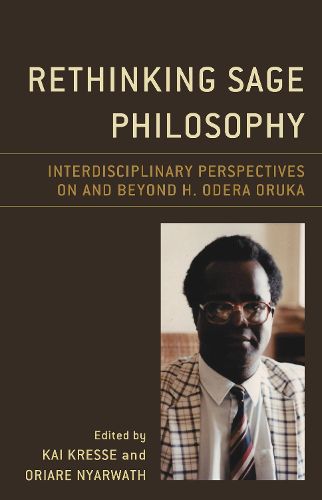Readings Newsletter
Become a Readings Member to make your shopping experience even easier.
Sign in or sign up for free!
You’re not far away from qualifying for FREE standard shipping within Australia
You’ve qualified for FREE standard shipping within Australia
The cart is loading…






Rethinking Sage Philosophy: Interdisciplinary Perspectives on and beyond H. Odera Oruka discusses a variety of aspects of Henry Odera Oruka’s sage philosophy project, rethinking it with a view to current demands and recent debates in scholarship across several disciplines. Edited by Kai Kresse and Oriare Nyarwath, the collection engages perspectives and interests from within and beyond African philosophy and African studies, including especially anthropology, literature, postcolonial critique, and decolonial scholarship. The chapters focus on: studies of women sages; sage philosophy in relation to oral literature; an Acholi poem on ‘being human’ in context; takes on aesthetics and gender in Maasai thought; a comparative discussion of Oruka’s and Gramsci’s approaches to the relevance of philosophy in society; a critical review of method; a comparative discussion dedicated to the project of decolonization, with a South African case study; and a conceptual reconsideration of Oruka’s understanding of sages, presenting the ‘pragmatic sage’ as typical of the late phase of the sage philosophy project.
$9.00 standard shipping within Australia
FREE standard shipping within Australia for orders over $100.00
Express & International shipping calculated at checkout
Rethinking Sage Philosophy: Interdisciplinary Perspectives on and beyond H. Odera Oruka discusses a variety of aspects of Henry Odera Oruka’s sage philosophy project, rethinking it with a view to current demands and recent debates in scholarship across several disciplines. Edited by Kai Kresse and Oriare Nyarwath, the collection engages perspectives and interests from within and beyond African philosophy and African studies, including especially anthropology, literature, postcolonial critique, and decolonial scholarship. The chapters focus on: studies of women sages; sage philosophy in relation to oral literature; an Acholi poem on ‘being human’ in context; takes on aesthetics and gender in Maasai thought; a comparative discussion of Oruka’s and Gramsci’s approaches to the relevance of philosophy in society; a critical review of method; a comparative discussion dedicated to the project of decolonization, with a South African case study; and a conceptual reconsideration of Oruka’s understanding of sages, presenting the ‘pragmatic sage’ as typical of the late phase of the sage philosophy project.